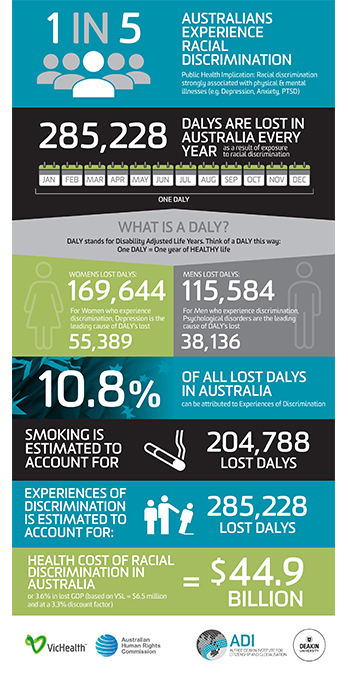
In his doctoral thesis, Measuring the Economic Costs of Racial Discrimination in Australia, Alfred Deakin Institute of Citizenship and Globalization researcher Dr. Amanuel Elias found that for each year between 2001 and 2011, racial discrimination cost the Australian economy an estimated $44.9 billion (U.S. $33.9 billion), or 3.6 per cent of the nation’s Gross Domestic Product in terms of specific health outcomes, including depression, anxiety, PTSD and psychological disorders.
According to the World Bank, Australia ranks as the 12th largest economy in the world in terms of GDP, with an output of (U.S.) $1.45 trillion in 2014.
One in five Australians suffer from racial discrimination. In his study, Elias offered that each year, exposure to racism costs the country with 285,228 healthy years of life lost (known as Disability Adjusted Life Years or DALYs). To put this in perspective, smoking costs Australia 204,788 DALYs each year. Elias offers that quantifying the cost of racism in Australian society is an important step towards addressing it.
“Racial discrimination costs society in both a microeconomic sense, such as indirect costs related to the labor market; and a macroeconomic sense, such as intangibles related to negative physical and mental health,” he said. “Once we know what racial discrimination costs society, we have a strong information base from which to launch an economic argument for making a reasonable effort to reduce racial discrimination.”

Graphic by Kris Pechotsch
The numbers, while high, focus solely on the health costs of racism in Australia. Elias noted the amount is likely to be higher when including indirect productivity costs. University of Queensland health economics professor Paul Frijters told SBS that these findings “don’t talk about the cost to education, or they don’t talk about the cost to self-esteem in the next generation, which can potentially also be very large. And so there are also areas where discrimination and racism are known in other countries to have quite a big effect, because we know, if people feel down because they feel racially discriminated (against), their brains actually operate less efficiently.”
Meanwhile, the cost of racism in the U.S., the world’s largest economy with a GDP of $17.4 trillion, is estimated at a whopping $1.9 trillion. A 2013 study from the W.K. Kellogg Foundation and scholars from Brandeis, Harvard and Johns Hopkins — The Business Case for Racial Equity — found that racism costs the U.S. economy “trillions of dollars in lost earnings, avoidable public expenditures, and lost economic output.” The authors of the report emphasized that when people are unable to achieve their full potential as a result of racial discrimination, a burden is placed not only on those who are disadvantaged, but also on communities, businesses, government and the entire economy.
“Racism in the U.S. has left a legacy of inequities in health, education, housing, employment, income, wealth, and other areas that impact achievement and quality of life,” the report said. “Opportunities that were denied to racial and ethnic minorities at critical points in the nation’s history have led to the disadvantaged circumstances that too many children of color are born into today.”
The report examined factors such as lack of opportunity in education and employment, health care disparities and the impact of incarceration. And the numbers are staggering. If America were to eliminate the earnings gap between whites and people of color, “the earnings gain would translate into $180 billion in additional corporate profits, $290 billion in additional federal tax revenues, and a potential reduction in the federal deficit of $350 billion, or 2.3% of GDP,” according to the report.
With people of color becoming a majority in the coming decades — they are 37 percent of the U.S. population now, but projected to become 46 percent by 2030 and 55 percent by 2050 — closing the earnings gap would prove even more dramatic in future years. For example, closing the earnings gap by 2030 would increase U.S. GDP by 16 percent — or over $5 trillion a year — also increasing federal tax revenue by more than $1 trillion and boosting corporate profits by $450 billion. Further, by 2050, closing this gap would cause GDP to jump 20 percent, the size of the federal budget, and greater than what the U.S. spends on healthcare.
In other words, racism will cost you quite a bit.


